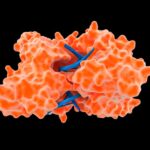 Alkaptonuria (AKU) is an ultrarare autosomal recessive disorder (MIM 203500) that is caused byby a complex set of mutations in homogentisate 1,2-dioxygenasegene and consequent accumulation of homogentisic acid (HGA), causing a significant protein oxidation. A secondary form of amyloidosis was identified in AKU and related to high circulating serum amyloid A (SAA) levels, which are linked with inflammation and oxidative stress and might contribute to disease progression and patients’ poor quality of life. Recently, we reported that inflammatory markers (SAA and chitotriosidase) and oxidative stress markers (protein thiolation index) might be disease activity markers in AKU. Thanks to an international network, we collected genotypic, phenotypic, and clinical data from more than 200 patients with AKU. These data are currently stored in our AKU database, named ApreciseKUre. In this work, we developed an algorithm able to make predictions about the oxidative status trend of each patient with AKU based on 55 predictors, namely circulating HGA, body mass index, total cholesterol, SAA, and chitotriosidase. For more information click here.
Alkaptonuria (AKU) is an ultrarare autosomal recessive disorder (MIM 203500) that is caused byby a complex set of mutations in homogentisate 1,2-dioxygenasegene and consequent accumulation of homogentisic acid (HGA), causing a significant protein oxidation. A secondary form of amyloidosis was identified in AKU and related to high circulating serum amyloid A (SAA) levels, which are linked with inflammation and oxidative stress and might contribute to disease progression and patients’ poor quality of life. Recently, we reported that inflammatory markers (SAA and chitotriosidase) and oxidative stress markers (protein thiolation index) might be disease activity markers in AKU. Thanks to an international network, we collected genotypic, phenotypic, and clinical data from more than 200 patients with AKU. These data are currently stored in our AKU database, named ApreciseKUre. In this work, we developed an algorithm able to make predictions about the oxidative status trend of each patient with AKU based on 55 predictors, namely circulating HGA, body mass index, total cholesterol, SAA, and chitotriosidase. For more information click here.
1.1K
